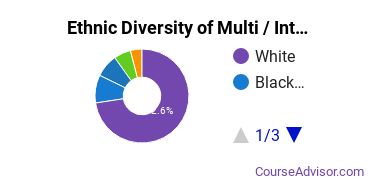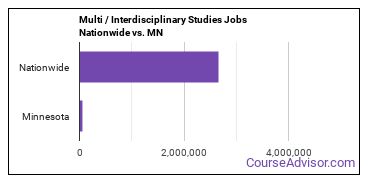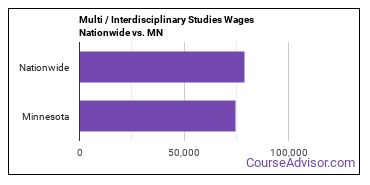Multi / Interdisciplinary Studies Schools in Minnesota
1,915 students earned Multi / Interdisciplinary Studies degrees in Minnesota in the 2022-2023 year.
As a degree choice, Multi / Interdisciplinary Studies is the 11th most popular major in the state.
Education Levels of Multi / Interdisciplinary Studies Majors in Minnesota
Multi / Interdisciplinary Studies majors in the state tend to have the following degree levels:
| Education Level | Number of Grads |
|---|---|
| Bachelor’s Degree | 1,337 |
| Master’s Degree | 392 |
| Associate Degree | 80 |
| Post-Master’s Certificate | 66 |
| Postbaccalaureate Certificate | 66 |
| Award Taking Less Than 1 Year | 24 |
| Doctor’s Degree (Research / Scholarship) | 13 |
| Doctor’s Degree (Professional Practice) | 13 |
| Doctor’s Degree (Other) | 13 |
| Award Taking 1 to 2 Years | 3 |
| Award Taking 2 to 4 Years | 3 |
Gender Distribution
In Minnesota, a multi / interdisciplinary studies major is more popular with women than with men.

Racial Distribution
The racial distribution of multi / interdisciplinary studies majors in Minnesota is as follows:
- Asian: 7.0%
- Black or African American: 7.0%
- Hispanic or Latino: 5.4%
- White: 57.9%
- Non-Resident Alien: 13.0%
- Other Races: 9.8%

Jobs for Multi / Interdisciplinary Studies Grads in Minnesota
There are 46,770 people in the state and 2,654,640 people in the nation working in multi / interdisciplinary studies jobs.

Wages for Multi / Interdisciplinary Studies Jobs in Minnesota
In this state, multi / interdisciplinary studies grads earn an average of $74,880. Nationwide, they make an average of $78,820.

Most Popular Multi / Interdisciplinary Studies Programs in MN
There are 11 colleges in Minnesota that offer multi / interdisciplinary studies degrees. Learn about the most popular 11 below:
82% of students get financical aid. 16 to 1 is the student to faculty ratio. The average student takes 4.20 years to complete their degree at UMN Twin Cities.
Request Information32% of the teachers are full time. A typical student attending Metro State will pay a net price of $19,523. 100% of students get financical aid.
Request InformationMost students complete their degree in 4.61 years. The full-time teacher rate is 65%. 16 to 1 is the student to faculty ratio.
Request InformationThe student to faculty ratio is 17 to 1. It takes the average student 4.08 years to graduate. Of all the teachers who work at the school, 25% are considered full time.
Request InformationMost students complete their degree in 4.42 years. This public school has an average net price of $17,699. Of all the teachers who work at the school, 59% are considered full time.
Request InformationThe average student takes 4.10 years to complete their degree at Hamline. An average student at Hamline will pay a net price of $21,691. Students enjoy a student to faculty ratio of 13 to 1.
Request InformationStudents who attend this private institution pay an average net price of $27,340. 11 to 1 is the student to faculty ratio. 100% of students get financical aid.
Request InformationThe student to faculty ratio is 17 to 1. Of all the students who attend this school, 96% get financial aid. The full-time teacher rate is 58%.
Request Information76% of students get financical aid. 44% of the teachers are full time. The student to faculty ratio is 23 to 1.
Request Information91% of students get financical aid. Students who attend this private institution pay an average net price of $29,697. 81% of the teachers are full time.
Request Information67% of the teachers are full time. 90% of students get financical aid. It takes the average student 4.56 years to graduate.
Request InformationMulti / Interdisciplinary Studies Careers in MN
Some of the careers multi / interdisciplinary studies majors go into include:
| Job Title | MN Job Growth | MN Median Salary |
|---|---|---|
| Archivists | 25% | $41,570 |
| Dietetic Technicians | 16% | $35,450 |
| Computer Workers | 10% | $77,560 |
| Anthropologists and Archeologists | 0% | $0 |
Explore Major by State
Alabama
Arkansas
Connecticut
Florida
Idaho
Iowa
Louisiana
Massachusetts
Mississippi
Nebraska
New Jersey
North Carolina
Oklahoma
Rhode Island
Tennessee
Vermont
West Virginia
View Nationwide Multi / Interdisciplinary Studies Report
References
More about our data sources and methodologies.










